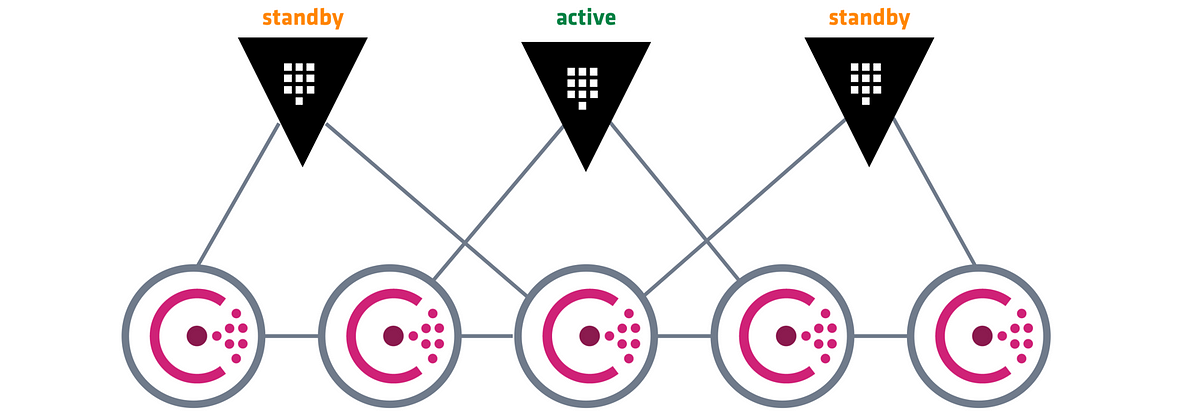vault-local-dev
vault-local-dev
https://github.com/fanqingsong/vault-local-dev
This is a docker compose setup for development work using Vault and Consul.

OIDC
https://www.microsoft.com/en-us/security/business/security-101/what-is-openid-connect-oidc
OpenID Connect (OIDC) defined
OpenID Connect (OIDC) is an identity authentication protocol that is an extension of open authorization (OAuth) 2.0 to standardize the process for authenticating and authorizing users when they sign in to access digital services. OIDC provides authentication, which means verifying that users are who they say they are. OAuth 2.0 authorizes which systems those users are allowed to access. OAuth 2.0 is typically used to enable two unrelated applications to share information without compromising user data. For example, many people use their email or social media accounts to sign in to a third-party site rather than creating a new username and password. OIDC is also used to provide single sign-on. Organizations can use a secure identity and access management (IAM) system like Microsoft Entra ID (formerly Azure Active Directory) as the primary authenticator of identities and then use OIDC to pass that authentication to other apps. This way users only need to sign in once with one username and password to access multiple apps.
vault
https://github.com/hashicorp/vault
Vault is a tool for securely accessing secrets. A secret is anything that you want to tightly control access to, such as API keys, passwords, certificates, and more. Vault provides a unified interface to any secret, while providing tight access control and recording a detailed audit log.
A modern system requires access to a multitude of secrets: database credentials, API keys for external services, credentials for service-oriented architecture communication, etc. Understanding who is accessing what secrets is already very difficult and platform-specific. Adding on key rolling, secure storage, and detailed audit logs is almost impossible without a custom solution. This is where Vault steps in.
The key features of Vault are:
Secure Secret Storage: Vault can store arbitrary key/value pairs. Vault encrypts data before writing it to persistent storage, so gaining access to the raw storage isn't enough to access your secrets. Vault can write to disk, Consul, and more.
Dynamic Secrets: Vault can generate secrets on-demand for some systems, such as AWS or SQL databases. For example, when an application needs to access an S3 bucket, it asks Vault for credentials, and Vault will generate an AWS keypair with valid permissions on demand. After creating these dynamic secrets, Vault will also automatically revoke them after the lease is up.
Data Encryption: Vault can encrypt and decrypt data without storing it. This allows security teams to define encryption parameters and developers to store encrypted data in a location such as a SQL database without having to design their own encryption methods.
Leasing and Renewal: Vault associates a lease with each secret. At the end of the lease, Vault automatically revokes the secret. Clients are able to renew leases via built-in renew APIs.
Revocation: Vault has built-in support for secret revocation. Vault can revoke not only single secrets, but a tree of secrets, for example, all secrets read by a specific user, or all secrets of a particular type. Revocation assists in key rolling as well as locking down systems in the case of an intrusion.
https://github.com/hashicorp/consul
Consul is a distributed, highly available, and data center aware solution to connect and configure applications across dynamic, distributed infrastructure.
- Website: https://www.consul.io
- Tutorials: HashiCorp Learn
- Forum: Discuss
Consul provides several key features:
Multi-Datacenter - Consul is built to be datacenter aware, and can support any number of regions without complex configuration.
Service Mesh - Consul Service Mesh enables secure service-to-service communication with automatic TLS encryption and identity-based authorization. Applications can use sidecar proxies in a service mesh configuration to establish TLS connections for inbound and outbound connections with Transparent Proxy.
API Gateway - Consul API Gateway manages access to services within Consul Service Mesh, allow users to define traffic and authorization policies to services deployed within the mesh.
Service Discovery - Consul makes it simple for services to register themselves and to discover other services via a DNS or HTTP interface. External services such as SaaS providers can be registered as well.
Health Checking - Health Checking enables Consul to quickly alert operators about any issues in a cluster. The integration with service discovery prevents routing traffic to unhealthy hosts and enables service level circuit breakers.
Dynamic App Configuration - An HTTP API that allows users to store indexed objects within Consul, for storing configuration parameters and application metadata.
Consul runs on Linux, macOS, FreeBSD, Solaris, and Windows and includes an optional browser based UI. A commercial version called Consul Enterprise is also available.
Please note: We take Consul's security and our users' trust very seriously. If you believe you have found a security issue in Consul, please responsibly disclose by contacting us at security@hashicorp.com.



